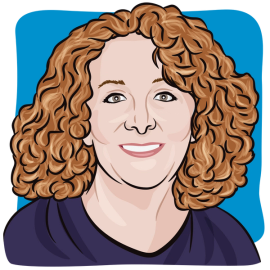- About Us
- Advertise / Support
- Editorial Board
- Contact Us
- CancerNetwork.com
- TargetedOnc.com
- OncLive.com
- OncNursingNews.com
- Terms & Conditions
- Privacy
- Do Not Sell My Information
- Washington My Health My Data
© 2025 MJH Life Sciences™ and CURE - Oncology & Cancer News for Patients & Caregivers. All rights reserved.
Living With My Chronic Cancer: Small Lymphocytic Lymphoma

F. Linda Cohen, from Baltimore, now lives in Franklin, Michigan. She attended UMBC and attained her Masters’ Degree from Oakland University, Rochester, Michigan. Linda, a retired reading specialist, with a specialty in dyslexia, published a book documenting her parents’ story in February, 2019. Cohen’s book, "Sarinka: A Sephardic Holocaust Journey From Yugoslavia to an Internment Camp in America," is currently in the libraries of the United States Holocaust Memorial Museum in Washington D.C. , Yad Vashem Holocaust Museum in Israel, the Zekelman Holocaust Memorial Center and other community and school libraries.
I've been living with small lymphocytic lymphoma for 14 years now, but it has taught be some valuable lessons about life.
I have been living with cancer for 14 years now. When I was first diagnosed, I was told there was no cure, but each doctor used the word, “indolent” as they tried to explain my new reality of living with a cancer diagnosis. I was told, “In cases like yours, the protocol is to watch and wait.”
I was told not to treat my cancer too early because then I would be using up my treatment options. “Try to live with it,” the doctors advised, “and we will check you every three months.”
It took quite a while to figure out how to do this. I vowed that I wouldn’t dwell on this and lose valuable living time. No one knows how long they have. A cancer diagnosis, most will agree, is a real wake-up call. As often happens, I had just retired and had all kinds of plans. First and foremost was to take care of my mother and spend more time with her. One thing I knew for sure was that my 91-year-old Holocaust survivor mother, would not be told about my diagnosis. I was not going to cause her any more pain. I decided this long ago as a teenager and I share this point with students when I tell them her story. She was close to death, so it became even more paramount, for her not to be plagued with news that her “healthy” daughter now had cancer. I needed to decide how I would navigate my world without my mother knowing, and I was fortunate that I had a good support system to help me.
It didn’t take too long before I needed treatment… It took 2 ½ years. I was told I needed to be treated with Rituxan (rituximab), a type of antibody therapy to help my immune system destroy cancer cells. After reading about the possible side effects, I called my doctor and told him, “I’m not sure I want to do this.” He assured me I wouldn’t take an aspirin if I read all the side effects either. His exact words were, “This treatment was made for you.” Until now, I was going to my doctor every three months with no issues. This is the first time I had a decision to make about treatment.I knew I needed to trust him, and I did. The treatment helped. He was right, so from there on out, I did what he told me to do because I had to trust someone and he was the one who gave me the most hope.
After seeing a few oncologists, I decided on this particular doctor for exactly that reason. When I told him I read the average life span with this was ten years, he told me, “But you’re not average. These averages are based on all ages, receiving a diagnosis at an early stage to stage 4. You caught it early, you’re in otherwise good health, and the diagnostic tests show you will respond well to treatment. Most likely, this will not be what kills you. You can live with this for a long time.” I gave him a big hug and said, “And that’s why you’re my doctor.” I still see him 14 years later. I needed the hope he gave me and then I could move forward.
I have had several different treatments now, ranging from infusion treatments to radiation and now a BTK inhibitor that I take every twelve hours, as well as IVIG antibodies to help my immune system every four weeks. But you know what? I have sincere gratitude for all of it. I feel so blessed that I am living in a time when all these options are available.
Now, I am thankfully, at a point, of not letting my cancer consume me. I have filled my life with meaningful things from spending time with my family, to speaking about my parent’s Holocaust journey, to writing for CURE (which I love!) and as of this week, I am launching a podcast to help children learn the joy of stories!
The best thing I did was realize how fragile life is. I try to do the things that give me the most joy. Living life to the fullest is perhaps a blessing in disguise that chronic cancer gives us.
For more news on cancer updates, research and education, don’t forget to subscribe to CURE®’s newsletters here.
Related Content:



